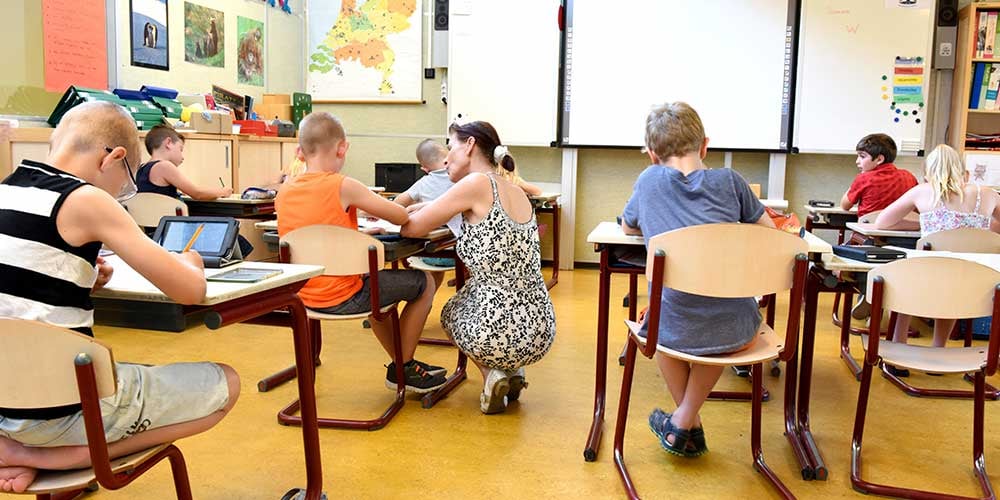Chapters
- What is dyslexia?
- Can dyslexia be treated with medication?
- What is the best intervention for dyslexia and can it be cured?
- What are the 4 types of dyslexia?
- How do you fix dyslexia in adults?
When Albert Einstein was in school, he couldn’t write. In his school report (1895), his teacher wrote, ‘He will never amount to anything’. He went on to become known as the smartest man that ever lived. It was because he had dyslexia. Read on to learn all about the gifts of dyslexia and how you can support your child to become the next Einstein!
What is dyslexia? 🧐
Many people would say that dyslexia is a learning difficulty; however, we like to see it as a learning difference. In the same way that people have different eye colours, some people have different brain types and dyslexia is when your type of brain processes information in a different way to most people.
An estimated 1 in 10 people in the UK have dyslexia – that’s a pretty big number! 🌏
People with dyslexic brains process information differently. This means that there are some things that dyslexic people might find a bit harder than the rest of the people out there.
For example, children with dyslexia might struggle with:
- Organising written work
- Planning or writing essays
- Spelling words correctly
- General organisational skills
On the other hand, children with dyslexia might excel at:
- Puzzle solving
- Thinking outside the box
- Verbal reasoning
- Creative tasks
Can dyslexia be treated with medication? 💊👎
The first question that many parents ask themselves when they learn that their child has dyslexia is: is there dyslexia treatment medication? Or in other words: how can I fix this? We cannot emphasise this enough: dyslexia. does. not. need. fixing.
Unlike other forms of learning ‘difficulties’, there is no medication for dyslexia – nothing that will help dyslexic people spell better or magically learn grammar. Most dyslexic people can learn these skills; however, it is going to be a harder journey for them and they will need a lot of support from their families and teachers.
Can dyslexia be cured?
Whilst there are no medicated treatments for dyslexia and no magical dyslexia cure, there are ways of treating dyslexia. The only cure for the symptoms of dyslexia is a positive growth mindset and lots of hard work!
Treatments for dyslexia: what is the best intervention for dyslexia? 📖
People often want to know how to treat dyslexia. Whilst there is no cure for dyslexia this doesn't mean that there isn’t a solution for dyslexia. In fact, there are many solutions for dyslexia. There are many things which you can do to help your child manage and overcome their symptoms. So what helps dyslexia?
💪 Talk with their teacher
Odds are this is not the first time that your child’s teacher has encountered a student with dyslexia. As a teaching professional, your child’s teacher probably has lots of advice on how to treat dyslexia and help your child.
Teachers regularly have meetings with parents to talk about how they can adapt their lessons to best suit the needs of their dyslexic pupils and, alongside parents, come up with strategies which work best to come up with a cure for dyslexia in your child.
Here are some of our top tips:
- Arrange for your child to use a laptop for their schoolwork. If you talk with the class teacher you may be able to get permission for your child to use a laptop in their lessons. This will help them overcome some of the symptoms of their dyslexia. 💻
- Extra-time in exams – students who are diagnosed with dyslexia are entitled to an extra time in formal assessments. This extra time is designed to help students with dyslexia process information. As well as making sure that they have time to reread questions it also gives them valuable time to check their answers for spelling, punctuation and grammar mistakes. 🕚
- Ask the teacher if they can check in with the pupil in lessons to make sure they are not falling behind as a result of their dyslexia.
💪 Arrange for some private 1:1 tuition
The new digital age of virtual learning means that it has never been easier to match your child with a specialist tutor who can help them overcome the symptoms of their dyslexia.
We at GoStudent have lots of experience tutoring children with dyslexia and helping them manage and overcome their symptoms. With a little bit of extra tutoring, your child will be able to better manage their symptoms so that they don’t fall behind in the neurotypical education system.
As well as giving them the extra academic boost, 1:1 tutoring can also give them the confidence they need to engage with their school lessons in a more meaningful way.
💪 Buy them books they want to read
Many parents think that after a certain age children need to start reading more ‘grown up’ books. It can feel a bit embarrassing when your friend’s child is reading The Count of Monte Cristo and your child is still on Captain Underpants.
If your child has dyslexia, let them read whatever it is that engages them with books. If they are into Captain Underpants, let them read Captain Underpants. If they like reading comics, graphic novels or any alternative form of literature, be happy for them and encourage them to do so.
One of the biggest barriers to dyslexic pupils developing their reading skills is that they struggle to engage with books. Don’t add more barriers to their learning by trying to get them to engage with literature that they are not yet ready for. Whilst this isn’t quick fix cure for dyslexia it can certainly help treat dyslexia.
💪 Let them explore the wonders of audiobooks
Audiobooks are technology’s gift to people with dyslexia. Without the stress and anxiety of words and letters jumping around on the page, people with dyslexia finally have an easier way to engage with stories and feed their literary curiosity. Amazon’s Audible is an excellent way to access audio books from your phone or tablet.
Some dyslexic students benefit from hearing books read out and enjoy reading along with a physical book whilst simultaneously listening to an audiobook. You need to explore and find out what works best for you and your child.
💪 Empower your child with the gift of dyslexia!
Let your child know that they have dyslexia and celebrate it with them. Yes, dyslexia can make aspects of your child’s learning difficult, but it can also enable your child to achieve great things. Tell your child that many of the world’s smartest, brightest and most influential people were dyslexic. They are part of a world-leading club which includes the likes of:
-
Albert Einstein – world-famous physicist
-
Richard Branson – one of the richest people in the world
-
Agatha Christie – famous novelist known for Poirot and Miss Marple
-
Leonardo da Vinci – a genius artist and designer who painted the Mona Lisa
-
Walt Disney – the man behind who founded the Disney empire
-
Whoopi Goldberg – actress, author and comedian
-
John F Kennedy – the former President of the United States of America
-
John Lennon – one of the most famous musicians of our time
-
Pablo Picasso – one of the greatest artists of the 20th Century
-
Steven Spielberg – one of the most influential people in the history of cinema
There is no cure for dyslexia, no perfect treatment for dyslexia, no dyslexia therapy and no magical dyslexia doctor but the closest thing we have is probably empowerment.
What are the different types of dyslexia?
There are many different types of dyslexia and while many of them have similar symptoms, there are some slight differences.
Here are some of the types you might like to know about…
- Phonological dyslexia
The most common one to be found in children is phonological dyslexia. This is when a person struggles with phonological awareness (phonology = understanding the sounds that words make).
Phonological dyslexia means that you can see a group of letters in a word but struggle to remember what sound those letters make. Phonological dyslexia is the reason that many children develop their reading skills at a later age than their peers.
-
Visual dyslexia
Visual dyslexia can affect the way someone processes things visually. They might see something but not fully process what they see This can make it difficult for children when they are learning the shapes of different letters and also mastering spelling – let’s be honest, a lot of English spelling makes little sense, and many people remember the shape of the word rather than the logic behind the spelling. This is something that people with visual dyslexia will struggle to do and it will result in poorer spelling and reading abilities.
-
Primary Dyslexia
Have you ever met a family where there are lots of dyslexic people? 👨👩👧👦 That probably means that they have primary dyslexia as primary dyslexia is passed down genetically. If you have primary dyslexia, there is a higher chance that your child will have it too. The symptoms of primary dyslexia last for life but – as explained earlier – can be overcome. 💪
-
Secondary dyslexia
Unlike primary dyslexia, secondary dyslexia is caused when brain damage occurs during the early stages of foetal development. 🤰 Similarly to primary dyslexia, the symptoms are lifelong but can also be overcome with work and support. 📚
-
Acquired dyslexia
Acquired dyslexia (sometimes called trauma dyslexia) is when someone develops dyslexia-like symptoms after an illness or trauma that causes damage to the area of the brain that controls reading and writing. This is very rare and not really something that most of us need to worry about.
How do you fix dyslexia in adults?
Many adults – especially from older generations – may have dyslexia and not even know it. In the past, dyslexia wasn’t really understood and many people assumed that children with dyslexia were just stupid or not trying hard enough 😔. We now know that that is very much not the case!
Similarly to children, there is no specific medication or dyslexia treatment for adults. Even if you are older, you can still learn how to develop skills which can help you manage and overcome your difficulties.
Adults with dyslexia tend to have the same symptoms that children do. They might struggle with reading, spelling, comprehension or time management.
So there is no magic cure or easy fix but we shouldn’t be sad or disheartened. As mentioned earlier, some of the world’s best and brightest 💡 have had dyslexia and whilst it adds some extra challenges, most of us – young and old – can get over those symptoms and go on to do amazing things! 😁🥳😎
If you want some extra help, sign up for a session with one of our experienced and vetted tutors! 









